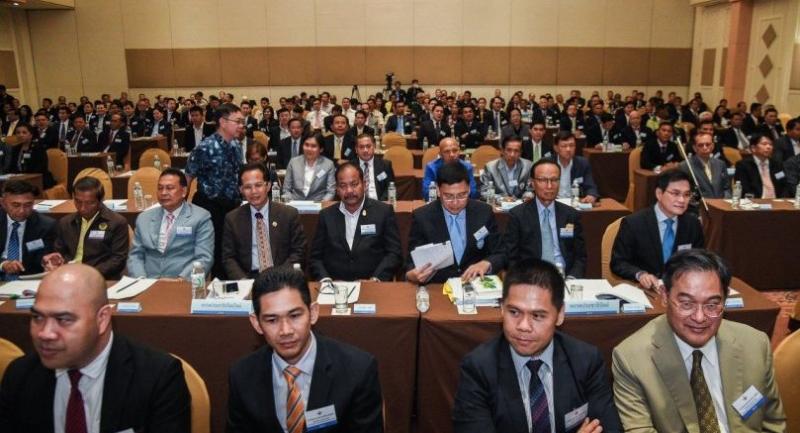Parties brace for cut in MP numbers

CONSTITUENCY CANDIDATES DOWN BY 25, BUT ADDITIONS TO PARTY LIST WILL STILL LEAVE PARLIAMENT WITH 5O0 LAWMAKERS
KEY POLITICAL parties are set to see a significant reduction in MPs after new regulations were issued reducing the number of constituency candidates.
For instance, Pheu Thai Party’s strongholds – the North and the Northeast – will lose 13 seats in Parliament, while the Democrat Party could lose six MPs, as the number of seats in the South and Bangkok has been reduced by three each.

The political parties will have no choice but to make adjustments in accordance with the new boundaries, according to observers.
Political analyst Stithorn Thananithichot said no parties were gaining an upper hand at this stage, adding that the impact of gerrymandering would only surface once the exact electoral boundaries are drawn.
The number of MPs from each province was published in the Royal Gazette yesterday.
Since the number of constituency candidates have been reduced by 25 – from 375 in 2011 to 350 based on the new Constitution – the decrease in the number of seats in some areas is natural.
The number of seats in Parliament is based on the population. As per government records, the population stands at 66,188,503 people, and every 189,110 people get to have one MP.
In the South – perceived as a Democrat Party stronghold – the number of MPs has gone down from 53 to 50. However, Nipit Intrasombat, a former Democrat MP from Phatthalung, said the swing in the number of constituency MPs was not unexpected.
“It’s nothing to be concerned about. We are very well aware of the change,” he told The Nation.
“As the total number has been cut down, it’s natural that we’ll see some changes. All parties are under the same system and affected by this equally.”
Despite three seats being taken away, Nipit said the Democrat Party will suffer little impact.
Besides, he said, some of the former Democrat candidates will not run in Surat Thani and Trang provinces, which have lost one seat each.
“One MP from Surat Thani said he will withdraw this time, while the one in Trang has been given a red card. So this works out perfectly,” he said.
Nikorn Chamnong, a key member from Chartthaipattana Party, whose stronghold in Suphan Buri province has also seen a reduction by one seat, said his party was prepared for the change and the candidate would be added to the party list instead.
“We anticipated this from the time the Constitution was promulgated last year and have been preparing for the change. We’re not surprised,” Nikorn said. “We can accept this. The number is reduced based on the population. It’s reasonable.”
Bound by law
Meanwhile, political analyst Stithorn, who hails from the King Prajadhipok’s Institute, explained that the reduction in MP numbers was dictated by law.
“It is what it is. The number of constituency MPs has to go down because the number of seats has dropped by 25. However, this number has been moved to the party-list allocation, which has risen to 150. We will still have 500 MPs, just like we did in the 2011 elections.”
However, he said, problems will arise with gerrymandering once the exact boundaries in each province are drawn.
“Unfair constituency boundaries or gerrymandering arises when a party’s stronghold is divided and it is put at a disadvantage,” he said. “That is when a party’s stronghold is separated into two constituencies, then that party may lose in that constituency.”
However, he said, unfair practices such as these are not easy to cover up.
The law dictates how the boundaries should be drawn, taking into account such things as geographical proximity, he said. Public hearings are also required, so parties or voters can complain if such irregularities occur, he added.
According to the Election Commission, the drawing of boundaries should be completed in 55 days.
